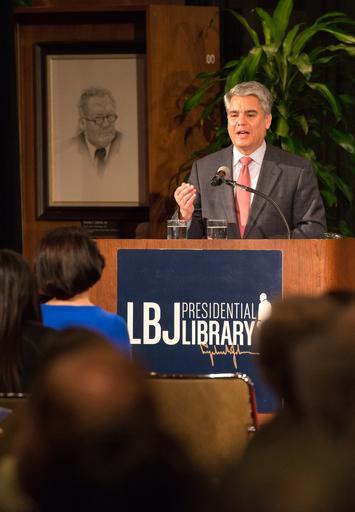MAKE A MEME
View Large Image

| View Original: | DIG13810.jpg (1355x1957) | |||
| Download: | Original | Medium | Small | Thumb |
| Courtesy of: | www.flickr.com | More Like This | ||
| Keywords: lbj president lyndon johnson library austin texas usa University of Texas President Greg Fenves introduces the discussion. On Sept. 29, 1965, in a Rose Garden ceremony surrounded by artists and lawmakers, President Lyndon B. Johnson signed into law the National Foundation on the Arts and the Humanities Act of 1965. The act called for the creation of the National Endowment for the Arts (NEA) and the National Endowment for the Humanities (NEH) as separate, independent agencies. The LBJ Presidential Library celebrated the 50th anniversaries of these two institutions with NEA Chairman Jane Chu and NEH Chairman William Adams on Monday, Dec. 7. The event in the Library Atrium was a conversation moderated by LBJ Library Director Mark Updegrove. The special event was hosted in partnership with the University of Texas at Austin’s College of Fine Arts, College of Liberal Arts, LBJ School of Public Affairs, Humanities Institute, Harry Ransom Center, Blanton Museum of Art, and Briscoe Center for American History; Humanities Texas, the Texas Cultural Trust, the Texas Commission on the Arts, and the Bullock Texas State History Museum. LBJ Library photo by Jay Godwin University of Texas President Greg Fenves introduces the discussion. On Sept. 29, 1965, in a Rose Garden ceremony surrounded by artists and lawmakers, President Lyndon B. Johnson signed into law the National Foundation on the Arts and the Humanities Act of 1965. The act called for the creation of the National Endowment for the Arts (NEA) and the National Endowment for the Humanities (NEH) as separate, independent agencies. The LBJ Presidential Library celebrated the 50th anniversaries of these two institutions with NEA Chairman Jane Chu and NEH Chairman William Adams on Monday, Dec. 7. The event in the Library Atrium was a conversation moderated by LBJ Library Director Mark Updegrove. The special event was hosted in partnership with the University of Texas at Austin’s College of Fine Arts, College of Liberal Arts, LBJ School of Public Affairs, Humanities Institute, Harry Ransom Center, Blanton Museum of Art, and Briscoe Center for American History; Humanities Texas, the Texas Cultural Trust, the Texas Commission on the Arts, and the Bullock Texas State History Museum. LBJ Library photo by Jay Godwin | ||||